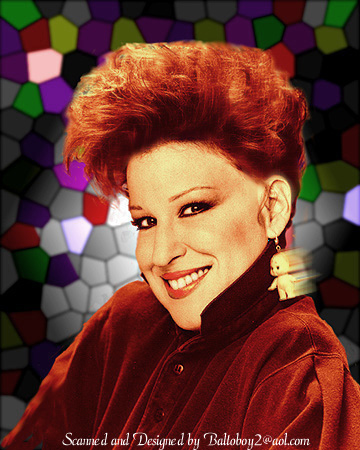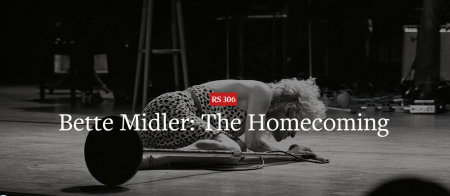People
Midler Has Been the Bette Noire of Showbiz, but Now She’s Baby Divine to the Literary SetBy Andrea Chambers
November 14, 1983 Vol. 20 No. 20
By Andrea Chambers

A division of Adobe Systems Incorporated
This image is also available in low resolution PICT and high resolution TIFF formats.
The red-and-black-net pouf bobbed up and down on her blond curls like an exotic overblown rose. “Lady authors always wear hats,” announced the imperious arriviste in the literary set. “So I owe it to my fans to wear something on my head.” That established, Bette Midler, 37, crossed her tiny feet in their red patent leather spike heels, fingered one of the silver hearts dangling from her ears and settled down at Manhattan’s midtown Barnes & Noble bookstore to autograph copies of her whimsical new poetic opus, The Saga of Baby Divine.
Six hours and 1,100 sales later the Divine Miss M was still cheerfully signing books and an occasional copy of her ninth and latest album, No Frills. Standing by were her dresser, her hair and makeup person, her publicist and her personal assistant–just in case the 5’1″ diva needed any little thing. But Bette’s only concern seemed to be pleasing the throng of fans, some of whom had begun lining up at 5 a.m. When one of the faithful asked, “How does it feel to be an institution?” Bette sassed back: “Don’t say that! I’m too young to be an institution. Besides, I’d rather be a bank!” When another admirer wondered what she would be doing next, Midler playfully wagged a finger and drawled: “Maybe the Met. You know, Bette at the Met!”
More accurately, Midler found herself, as she delicately put it, “flogging myself into a stupor” selling books on an 11-city tour. She is already a published author with A View From a Broad, her 1980 best-seller about taking her act on a world tour. But The Saga of Baby Divine (Crown, $11.95) is obviously far closer to her boa-draped heart. “I was dozing one night, and I had this vision that I would write a children’s book about a baby,” reports Midler. “She’d have red hair, high heels, and say just one word: ‘More!’ ”
Duly inspired, Bette acquired a rhyming dictionary, a $50,000 advance and an illustrator (Todd Schorr) who shared her passion for Disneyesque style and colors. The result–a 65-page fairy tale/parable/epic poem about a plucky infant heroine–is rising high on best-seller lists. It obviously appeals to adults as much as to children for its thinly veiled philosophy about living life to the fullest. (“Make sure that your Life is a Rare Entertainment! It doesn’t take anything drastic You needn’t be gorgeous or wealthy or smart, Just Very Enthusiastic!”)
For Bette, Baby Divine is, in a curious way, a means of spreading the same message she tries to convey in her shows. “I may put several thousand feet of tulle around it,” she explains, “but my message is that people should feel hope, overcome fear and stand on their own. Of course, I’m discreet about it in my way,” adds the woman who performs part of her act wearing a mermaid’s tail and riding in a wheelchair. “But I think of it as a grand thing, almost as a mission.”
How long the Divine mission will continue remains to be seen. “Show business has nothing to do with art anymore,” Midler says. “It’s only about money. I don’t know how much longer I’ll stay around. I’d like to find something else to do. Maybe I’ll write parodies. You know, send-ups of Judith Krantz or Harold Robbins.”
At the very least, literary efforts might be easier on Midler than the grueling traveling life of a singer. She had some frightening moments last summer when she collapsed during a concert in Clarkston, Mich. outside Detroit. “It was 104°. I hadn’t been sleeping, and I felt sick as a dog before the show,” she recalls. “During the number Pretty Legs and Great Big Knockers I felt ready to faint. I ran offstage for the balloons I needed for the number and I blacked out. One lonely little balloon came bouncing back onstage with no Bette behind it.” A doctor in the house–a podiatrist, Midler notes with a touch of irony–came to revive her, as did paramedics. Later, at a nearby hospital, she decided she was dying. “I was sure I wouldn’t get better. I felt panic-stricken and I couldn’t stop crying. Then I started to take stock. I thought of all the people I hadn’t seen. And I really wanted to see my mother, but I couldn’t,” she says of Ruth Midler, who died of cancer in 1979.
It also crossed her mind that she didn’t have a will. “I thought that was a mistake,” Midler admits. “I could see the government cleaning me out.” But fortunately for Midler, who has grossed $8 million on her concert tour this past year, the IRS is no richer by reason of her demise. She recuperated nicely (doctors said it was the heat, exhaustion and a gastrointestinal ailment) and resumed her traveling act, De Tour. “I felt a funny weakness when I went back,” she remembers. “I thought: ‘What if it happens again?’ ” When the inevitable question arose that booze or drugs were involved, Bette was straightforward. “I have a little bit of champagne now and then, but I’ve given up brandy, because that made me a mean drunk, the lowest. I would slur and spit and call people names. Once I tried to scratch someone’s eyes out.” As for drugs: “I have taken plenty, but not anymore. I can’t stand that overwhelming sense of paranoia and helplessness you get. I just despise it. But I can understand why performers do it. You get so exhausted, so unable to think. You take a toot to wake up. I can see how this life can do it to you.”
Exhaustion is etched on Midler’s face later as she sits in her pastel-hued Manhattan loft. For a few brief moments she is alone. Her entourage has gone off in the limo. Her boyfriend, Frenchman Benoit Gautier, 37, a public relations man who shares her Mediterranean-style stucco house in Beverly Hills, is not around. Bette curls up in a corner of a mauve velvet sofa. “It’s hard to be on all the time,” she reflects. “Sometimes I look at myself onstage and I say: ‘Who is that person?’ It’s like it’s someone else. I feel no connection.”
The private Bette can be disarmingly subdued and gentle. The strongest expletive from these lips is “Jesus, Mary and Joseph.” The trappings of her other life, the interior bookish world she says she has inhabited since her childhood in Hawaii, are all around her. Volumes by Shakespeare and Molière are lined up on a bookshelf near a pair of rhinestone platform heels, a gift from Cher. “I’m way behind. I haven’t read too many best-sellers lately. I’m still plowing through [historians] Will and Ariel Durant,” she reports. Midler also admits to devouring books on art and the theater. “I love reading about stuff that has gone on before–circus acts, bubble dancers, fan dancers. My favorite was the Frenchman Le Petomane. He’s the guy who farted the Marseillaise in tune.”
Just then a tugboat chugs its way down the Hudson outside Bette’s picture window, and she is up gazing out like a child. “If I were a boat, I’d be a tugboat,” she says wistfully. “Squat, hardworking, homey, with a touch of whimsy. I’ve always thought of myself as a Tugboat Annie type.”
She prevails, of course, as an outrageously flamboyant chanteuse who began by entertaining gays at Manhattan’s Continental Baths. Guided by her manager, Aaron Russo, who was also her lover, Midler rose to movie stardom as a Janis Joplin-like singer in The Rose (for which she won an Oscar nomination in 1980). “Aaron had a mythic obsession with me,” says Midler. “I wanted to be free, and he wanted me to be his. There were some bad times.” One of the worst came after they had stopped working together. Russo came to see Midler’s 1979 Broadway act, Bette! Divine Madness. “He told me it was a terrible show. He said I was ruining all he had done for me and that I looked like an albino onstage,” she says. “When he told me this, I was sick with bronchitis. I had my head in the toilet, barfing. Aaron always did know my weakest moments, and then he would strike. After that, I never saw him again.”
For his part, Russo now concedes that he was “probably too overbearing. I was insecure about our relationship and that put pressure on her.” But, he adds, “You have to give her everything, to get in the trenches with her. She loves to fight. It’s difficult to be in the business and in bed with her.”
Since the breakup with Russo, Midler has involved herself much more in her business. But she misses being able to bounce ideas off Aaron. He would not, Midler admits, have supported her decision to make her ill-fated film Jinxed in 1981. “Jinxed was pretty rotten. I didn’t get along with the people I was working with.” In one of the lower moments, Bette claimed that the director of the movie, Don Siegel, “hauled off and hit me.” Eventually the acrimony took its toll: “I held it in during the shooting, but for six months I was in a state of despair. I lay in bed, moaning and crying. Sure I saw a shrink. Wouldn’t you? I don’t think it was a clinical breakdown, but I felt it was.”
Midler’s Jinxed co-workers have had unkind words for their star. “A really tough customer” is how Siegel described her at the time. “It’s obvious she’s insecure. She trusted no one.” Midler’s co-star in the film, Ken Wahl, was more blunt: “It was miserable working with her, and it took all my concentration to get up and go to work in the morning.”
The Jinxed experience left Midler wary but still willing to deal with Hollywood. “I’m available for a movie,” she says. “But they’re not exactly beating down my door.” Bette is mulling a few scripts, including a comedy written for her by playwright John Guare. She’s also considering an offer to take her new act to Europe.
Mostly she wants to withstand the pressures of performing and hyping her book “with dignity and a measure of success.” Midler is also contemplating motherhood. “I’ve got to have my baby before the next year is out. After 35 you think of time in a whole new way.” She doesn’t necessarily think of motherhood and marriage in the old way: “Yes, I’d get married, but only if I felt like it, and not necessarily first.” As to whether Benoit (pronounced Benwah) is the likely candidate for husband or father, Bette is vague. “I’ve been with him three years, you know, and three years has been my limit with men. His time is nearly up.” The expression in her eyes, however, implies the contrary.
When her schedule allows, she and Benoit slip off together. Recently they visited West Berlin, because Midler is interested in the Bauhaus architectural school, and also toured East Berlin. En route home, they took in Victor Hugo’s house on the Channel Islands.
Through it all, Midler insists that her life is tame. “I wish more stuff happened to me,” she says, slapping a leg clad in Fiorucci jeans. Out on the river, another tugboat toots. “After all,” continues Bette with a mock pout, throwing her hands out diva style, “I still haven’t slept with Warren Beatty.”








